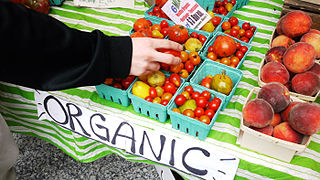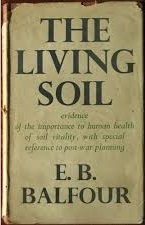Related Research Articles

Organic farming, also known as ecological farming or biological farming, is an agricultural system that uses fertilizers of organic origin such as compost manure, green manure, and bone meal and places emphasis on techniques such as crop rotation and companion planting. It originated early in the 20th century in reaction to rapidly changing farming practices. Certified organic agriculture accounts for 70 million hectares globally, with over half of that total in Australia. Biological pest control, mixed cropping, and the fostering of insect predators are encouraged. Organic standards are designed to allow the use of naturally-occurring substances while prohibiting or strictly limiting synthetic substances. For instance, naturally-occurring pesticides such as pyrethrin are permitted, while synthetic fertilizers and pesticides are generally prohibited. Synthetic substances that are allowed include, for example, copper sulfate, elemental sulfur, and veterinary drugs. Genetically modified organisms, nanomaterials, human sewage sludge, plant growth regulators, hormones, and antibiotic use in livestock husbandry are prohibited. Organic farming advocates claim advantages in sustainability, openness, self-sufficiency, autonomy and independence, health, food security, and food safety.
Vegan organicagriculture is the organic production of food and other crops with minimal animal inputs. Vegan organic agriculture is the organic form of animal-free agriculture.

The organic movement broadly refers to the organizations and individuals involved worldwide in the promotion of organic food and other organic products. It started during the first half of the 20th century, when modern large-scale agricultural practices began to appear.

Organic certification is a certification process for producers of organic food and other organic agricultural products. In general, any business directly involved in food production can be certified, including seed suppliers, farmers, food processors, retailers and restaurants. A lesser known counterpart is certification for organic textiles that includes certification of textile products made from organically grown fibres.

The Living Soil (1943) by Lady Eve Balfour is considered a seminal classic in organic agriculture and the organic movement. The book is based on the initial findings of the first three years of the Haughley Experiment, the first formal, side-by-side farm trial to compare organic and chemical-based farming, started in 1939 by Balfour, on two adjoining farms in Haughley Green, Suffolk, England.
The Haughley Experiment was the first comparison of organic farming and conventional farming, started in 1939 by Lady Eve Balfour and Alice Debenham, on two adjoining farms in Haughley Green, Suffolk, England. It was based on an idea that farmers were over-reliant on fertilizers, that livestock, crops and the soil should be treated as a whole system, and that "natural" farming produced food which was in some way more wholesome than food produced with more intensive methods. Lady Balfour believed that mankind's future and human health were dependent on how the soil was treated, and ran the experiment to generate scientific data that would support these beliefs.
IFOAM – Organics International is a worldwide organization advocating for organics, with over 700 affiliates in more than 100 countries and territories.
Rodale, Inc., was an American publisher of health and wellness magazines, books, and digital properties headquartered in Emmaus, Pennsylvania, with a satellite office in New York City. The company was founded in 1930. In 2017, it was acquired by New York City-based Hearst Communications, a media conglomerate.

Adrien Sibomana was the prime minister of Burundi from 19 October 1988 until 10 July 1993. He was a member of UPRONA. He is an ethnic Hutu and was appointed by the Tutsi President Pierre Buyoya in an unsuccessful attempt to appease Hutus by giving a few high government posts to them. Sibomana was the first Hutu prime minister since 1973 and had been the governor of Muramvya Province previously.
The Principles of Organic Agriculture were established by the International Federation of Organic Agriculture Movements (IFOAM) in September 2005. They are aspirations for organic farming. The Principles were approved by the General Assembly of IFOAM on September 25, 2005.
The Organic Trade Association (OTA) is a membership-based business association that focuses on the organic business community in North America. OTA's mission is to promote ethical consumerism by promoting and protecting the growth of organic trade to benefit the environment, farmers, the public, and the economy. OTA is a member of IFOAM – Organics International and The International Working Group on the Global Organic Textile Standard.
KRAV may refer to:
Organic wild refers to organic agriculture products which are collected from wild land. As of 2005, organic wild products are farmed on approximately 62 million hectares. According to the International Federation of Organic Agricultural Movements 36% of these were bamboo shoots, 21% were fruits and berries, and 19% were nuts. The first IFOAM conference on organic wild products was held in May 2006.

Organic farming is practiced around the globe, but the markets for sale are strongest in North America and Europe, while the greatest dedicated area is accounted for by Australia, the greatest number of producers are in India, and the Falkland Islands record the highest share of agricultural land dedicated to organic production.
Participatory Guarantee Systems (PGS), as defined by IFOAM, are "locally focused quality assurance systems. They certify producers based on active participation of stakeholders and are built on a foundation of trust, social networks and knowledge exchange." They represent an alternative to third party certification, especially adapted to local markets and short supply chains. They can also complement third party certification with a private label that brings additional guarantees and transparency. PGS enable the direct participation of producers, consumers and other stakeholders in:
Organic aquaculture is a holistic method for farming fish and other marine species in line with organic principles. The ideals of this practice established sustainable marine environments with consideration for naturally occurring ecosystems, use of pesticides, and the treatment of aquatic life. Managing aquaculture organically has become more popular since consumers are concerned about the harmful impacts of aquaculture on themselves and the environment.

The National Association for Sustainable Agriculture, Australia (NASAA) is an Australian and international organic certifying agency and trade association, located in Stirling, South Australia.
Asia Regional Organic Standard (AROS) is a common regional standard for organic production in East, South-East and South Asia. AROS results from a process intended to harmonize existing organic standards in that region and to promote new ones. It was launched by the Global Organic Market Access (GOMA) project, sponsored by Food and Agriculture Organization of the United Nations (FAO), International Federation of Organic Agriculture Movements (IFOAM), and United Nations Conference on Trade and Development (UNCTAD).
Bharat Bhushan Tyagi is an Indian farmer, educator and trainer from Bulandshahr, Uttar Pradesh, who was awarded the Padma Shri, the fourth highest civilian award in India, in 2019. He organises weekly training for farmers at Bulandshahr and has trained over 80,000 farmers. He is also a recipient of Progressive Farmer Award by the Prime Minister, Narendra Modi.
References
- ↑ Lohr, Luanne; Salomonsson, Lennart (2000). "Conversion subsidies for organic production: results from Sweden and lessons for the United States" (PDF). Agricultural Economics. 22 (2): 133–146. doi:10.1111/j.1574-0862.2000.tb00013.x.
- ↑ "List of IFOAM Affiliates". IFOAM. Retrieved 6 September 2014.